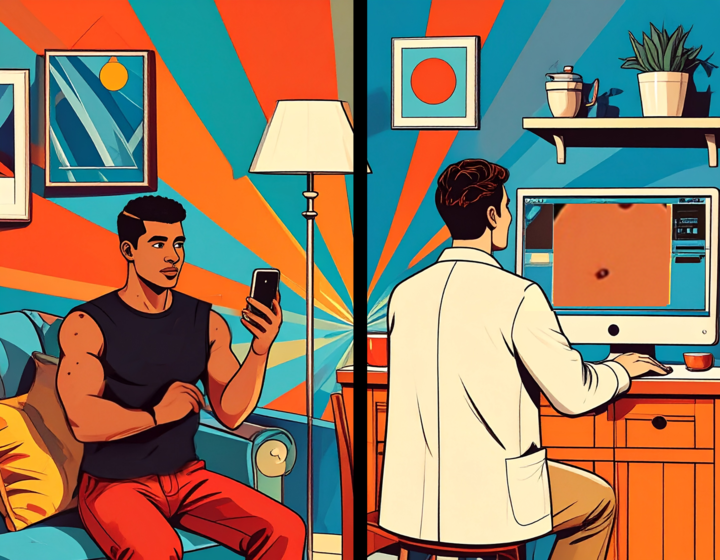Why Telehealth is the Next Step in Skin Health

Why Telehealth is the Next Step in Skin Health
Picture this: you notice a new mole on your body that looks a little different. You know you should see a dermatologist, but the soonest appointment is weeks to months away, the office is across town, and you’re juggling work, family, and a busy schedule. What if it’s no big deal? You wouldn’t want to put in the time and money if it’s nothing serious. It’s easy to put it off, but what if it’s something more?
This is where telehealth can step in. Instead of facing lengthy waits for an appointment, you can connect with a board-certified dermatologist from your phone or computer. All from the comfort of home, on your schedule. Dermatology is an incredibly visual field, which makes it especially well suited for telehealth. Many conditions can be diagnosed from an image alone. By simply uploading a clear photo, patients can get a response from a board-certified dermatologist within days, complete with a treatment plan, prescription, or advice.
If something more serious is suspected, the dermatologist will advise the patient to seek in-person care with a local provider. The key difference is that these steps are only recommended when truly necessary. That means fewer office visits, faster answers, and peace of mind without the long wait times that come with dermatology visits. Telehealth doesn’t replace traditional dermatology— it makes it more efficient.
Dermatology is one of the top specialties suited for telehealth. Here’s why:
- The average wait time to see a dermatologist in the US is over 36.5 days. With telehealth, patients can often receive feedback within 24 hours.
- Teledermatology cuts wait times for in-person dermatology visits by 78%, making care much faster and more accessible.
- Studies show that teledermatology catches nearly all skin cancers using just photos with about 95% detection accuracy.
- An NIH study found that 86% of participants had a positive overall experience with teledermatology.
These numbers show a clear shift: patients want faster access, and telehealth is making that possible.
More Than Just Convenience
Telehealth doesn’t only save time. It opens doors for people who might otherwise go without care through:
- Accessibility: Over 70% of U.S. counties don’t have a practicing dermatologist, leaving rural and underserved communities with major access gaps.
- Early detection: Faster appointments mean catching serious conditions, like skin cancer, sooner. When caught early, melanoma has a 99% survival rate.
- Affordability: Virtual visits are often less expensive than in-person appointments.
- Privacy and comfort: No crowded waiting rooms, no rearranging schedules; just answers from the comfort of your home.
For many patients, telehealth is the difference between waiting weeks with anxiety or getting peace of mind within days.
A Safer, Smarter Next Step
Telehealth is also evolving quickly. Dermatologists are starting to use AI-assisted tools to analyze images by helping flag suspicious spots for closer review. Secure apps, such as SkinCheck, now allow users to track changes in their skin over time and share updates directly with their doctor.
Importantly, telehealth isn’t replacing in-person dermatology. Instead, it’s expanding access. Serious cases will still need office visits, biopsies, or procedures, but the first step toward care can often happen virtually.
The Future of Skin Health
The bottom line? Telehealth is not a passing trend. It’s the next step in skin health. It makes expert care more accessible, helps detect problems earlier, and fits into real people’s lives more seamlessly than the traditional model.
So, if you’ve been putting off that skin concern because of long waits or busy schedules, telehealth may be the solution you’ve been waiting for. With telehealth, the future of skin care isn’t just more convenient, it’s smarter, more personalized, and more equitable. Through end-to-end services like SkinCheck, the dermatologist’s office is only a few clicks away.
Chuchu, N., Dinnes, J., Takwoingi, Y., Matin, R.N., Bayliss, S.E., Davenport, C., Moreau, J.F., Bassett, O., Godfrey, K., O’Sullivan, C., Walter, F.M., Motley, R., Deeks, J.J. and Williams, H.C. (2018). Teledermatology for diagnosing skin cancer in adults. Cochrane Database of Systematic Reviews. [online] doi:https://doi.org/10.1002/14651858.cd013193.
Cleveland Clinic (2021). Melanoma. [online] Cleveland Clinic. Available at: https://my.clevelandclinic.org/health/diseases/14391-melanoma.
Feng, H., Berk-Krauss, J., Feng, P.W. and Stein, J.A. (2018). Comparison of Dermatologist Density Between Urban and Rural Counties in the United States. JAMA Dermatology, 154(11), p.1265. doi:https://doi.org/10.1001/jamadermatol.2018.3022.
Giavina-Bianchi, M., Santos, A.P. and Cordioli, E. (2020). Teledermatology reduces dermatology referrals and improves access to specialists. EClinicalMedicine, p.100641. doi:https://doi.org/10.1016/j.eclinm.2020.100641.
Hamad, J., Fox, A.W., Kammire, M.S., Hollis, A.N. and Saif Khairat (2021). 26189 Patient Satisfaction with Teledermatology during the Covid-19 Pandemic. Journal of the American Academy of Dermatology, [online] 85(3), pp.AB87–AB87. doi:https://doi.org/10.1016/j.jaad.2021.06.373.
Statista. (2025). Wait times for a dermatology appointment U.S. 2025| Statista. [online] Available at: https://www.statista.com/statistics/1489221/dermatology-office-wait-times-in-days/?srsltid=AfmBOooOrF3F159L0VTv6xSR64HLkmScggQuVQ38punYoVSinq14f9OU [Accessed 22 Sep. 2025].
This overview highlights how telehealth is transforming skin health by making dermatology care more accessible and supporting timely skin evaluations. For more information, please visit the American Academy of Dermatology (AAD) website or consult with your dermatologist.
Take Control of Your Health
Discover how SkinCheck can help you detect skin cancer early.
Discover insightful articles on various topics.



.png)

